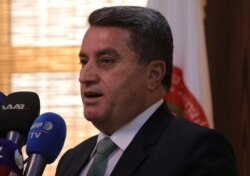Syrian Kurdish officials determined to bring captured Islamic State foreign fighters to justice may have to do so without assistance from the international community.
Support for a special tribunal, to the extent it existed, appeared to crumble this week as a growing number of nations are declining to back the latest proposal to put about 2,000 IS fighters who flocked to Syria on trial in the country’s Kurdish-led region.
The biggest blow came from Finnish officials, who said reports that they had offered assistance to the autonomous administration in northeast Syria had been exaggerated, following a meeting last week in Helsinki.
“Finnish representatives took note of the administration’s plans,” the Finnish Foreign Ministry said in a statement to VOA, regarding the meeting between Abdulkarim Omar, the administration’s foreign relations representative, and Finnish Foreign Minister Pekka Haavisto.
“At the same time, we highlighted many of questions that remain open, including the jurisdiction and legislation applied, and the applicability of international conventions,” the statement added.
The initial plan to hold a tribunal for the IS foreign fighters called for trials to begin within three months. But this week, citing support from Finland and other unnamed countries, Kurdish officials said the proceedings would get underway next month.
Coalition members hesitant
But members of the Global Coalition to Defeat IS have been hesitant to give their blessing.
“We believe that foreign terrorist fighters need to be returned to their home countries,” Ambassador James Jeffrey, the U.S. special envoy to Syria, told reporters Wednesday.
“The policy should be, as we have done with some eight people brought back, is to put them on trial,” he said.
But officials with the Kurdish-led autonomous administration have argued such calls are not enough, arguing that, until now, only a small percentage of IS fighters and their family members have been repatriated.
In the meantime, they say, about 2,000 IS foreign fighters and 12,000 IS-affiliated women and children from an estimated 53 countries are stuck in the autonomous area, living in makeshift prisons or displaced-persons camps, straining the region’s meager resources.
“We are in a period of siege,” Fener al-Kait, assistant minister for the autonomous administration’s external affairs ministry, said in a statement. “There is the urgent need for a solution to this issue in our region, and to pressure states to receive their nationals.”
For months now, the autonomous administration and the Syrian Democratic Forces have been trying to ease the strain, releasing dozens of Syrian IS fighters and hundreds of their family members to local or tribal officials.
These local and tribal officials say they ensure the convicted fighters serve their sentences and guarantee that none of those released fall back in with IS.
But the limited program, which has the support of U.S. officials, has only done so much to relieve overcrowding in SDF-run prisons or free up resources that Kurdish officials say are being stretched to their limits.
Whether tribunals for the IS foreign fighters will ease the burden remains to be seen.
No assurance of repatriation
Syrian Kurdish officials say under the current plan, any foreign fighters convicted of crimes would remain in SDF custody. And there are no assurances convicted fighters would be repatriated to their countries of origin upon serving out any sentences.
Also, there has been some movement by countries to take back some of the IS women and children.
Kazakhstan has been praised for taking back hundreds of women and children. And Somali officials tell VOA their government would be willing to evacuate some of the noncombatants if European countries refuse to take them back.
“This is a huge problem on the international level, and we cannot solve it on our own,” Omar said in a statement following last week’s meeting with Finnish officials. “We have to solve it together.”






